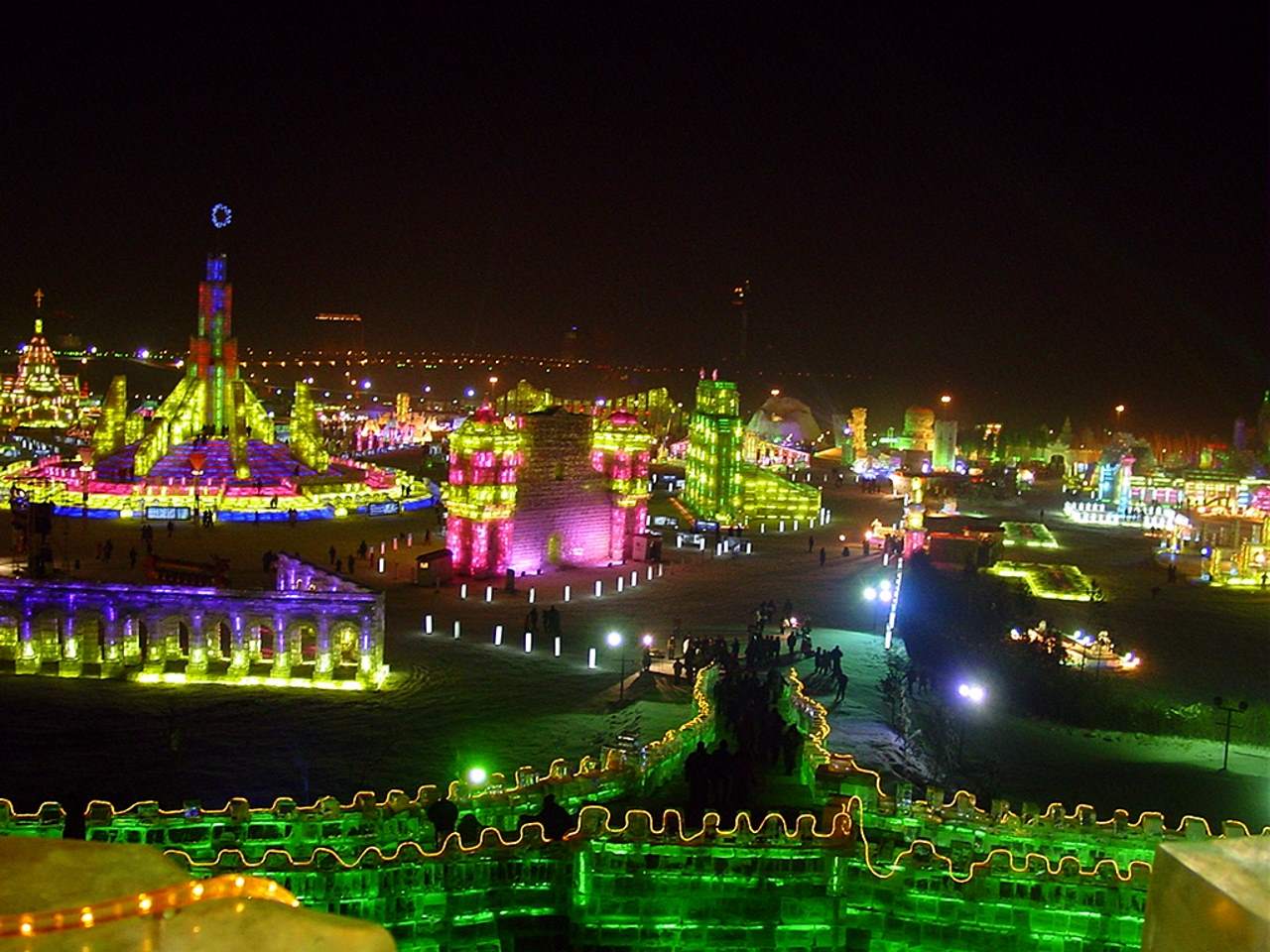Travelling abroad is no longer a luxury. It is becoming a lifestyle, especially for Indian travellers. With a growing number...
Read More
January 15, 2026
Unlock the World: Top Visa-Free Countries for Indians in 2025

Harbin International Ice and Snow Sculpture Festival is one of the biggest annual snow-themed winter festivals in the world. Held in Harbin, the capital of the Heilongjiang province of China, this festival will officially run from 24 December 2018 to 28 February 2019. Although, the exhibitors often come before time and stay for a longer time as the weather works very much in their favor.
In its early days, the festival saw only local Chinese competitors. The festival has now got global recognition and sees competitors from all around the world, making it is the world’s biggest winter festival. The festival experiences 10 to 15 million visitors annually to witness the craftsmanship of over 10,000 workers.
In the last decade, the festival grew in international participation with the growing economy of the country and with that, the size of the sculptures go higher. The uniqueness of the Harbin festival lies in the size of the sculptures and the beautiful lighting. The sculptures have a lot going on behind the scenes. Each of the sculpture has computer controlled LED lighting systems which are designed to give the best experience based on the time of day.
The festival has three main venues as follows:
Being the second biggest venue of the annual Harbin Ice and Snow Sculpture Festival, it houses a zoo for the Siberian tigers, and has become Harbin’s main parkland / recreation area. It is also open for visitors all year round. The Sun Island displays snow sculptures that can be viewed in daylight.
Zhaolin Park is one of the three principle competitions and show scenes of the world’s greatest ice and snow celebration in Harbin. Zhaolin Park is the show territory for the ice lights and one ought to go there when it is dusk.
It is the most popular and breathtaking area of the famous festival. It houses sculptures of massive size like palaces, buildings, great wall of China etc. The gigantic sculptures for display at the Ice and Snow World can reach as high as 46 meters in height. The tens of meter high ice manifestations are extremely beautiful at night time, with all the lighting adding to its extravagant beauty at the Grand World of Ice and Snow territory.
Harbin is one of the largest and most populous cities in this northeastern region. It is an important industrial base of the nation as well as a hub of politics, economics and culture. Harbin gets its name from the Manchu word meaning ‘a place for drying fishing nets’. The city first prospered when it was founded in 1898, with the coming of the Chinese Eastern Railway. It grew from a small rural settlement on the Songhua River to a region inhabited by a majority of immigrants from the Russian Empire. In the 1920s, the city was considered China’s fashion capital as new designs would first arrive here from Paris and Moscow before reaching Shanghai.
Harbin has the coldest weather and longest winter among Chinese cities. With a 24-hour average in January of only −17.6 °C, it’s nickname ‘The Ice City’ is well-earned. Over the years, Harbin has been known for its winter tourism and recreations. But don’t miss the chance to visit many of the other fascinating places in Harbin too.
The Cathedral of the Holy Wisdom of God or Saint Sophia Cathedral is a former Russian Orthodox church. It is located in the central district of Daoli, on the corner of Toulong Street and Zhaolin Street. The main structure is laid out like a cross, and the main hall is topped with a huge green-tipped dome. In bright sunlight, the church and the square area where it stands on, looks quite like Red Square in Moscow. Originally built in 1907, it underwent a nine year renovation and expansion during the 1920s. The present-day St. Sophia Church is the largest Orthodox church in the Far East and is hailed as a monumental work of art. In 1997 the cathedral was turned into Harbin Architectural Art Gallery and showcases the multi-cultural art and architectural developments of Harbin throughout the ages.
The Church of the Intercession, is an Eastern Orthodox Church. It was formerly also called the Ukrainian Church. It is currently the only Orthodox Church not only in Harbin but in all of mainland China, open to Chinese nationals for regular worship. In 1922, the Russians built a wooden church building at the site of current church. And in 1930, the China Eastern Railway donated the present stone church building. This church is located in the ‘Church Street, north east of ‘Hongbo Square’ on East Dazhi Avenue. On this ‘Church Street’ one can also visit the Protestant Harbin Nangang Christian Church and the Catholic Sacred Heart Cathedral of Harbin.
Yabuli Ski Resort is built on Yabuli Sun Mountain, which is a part of the Changbai Mountain Range. It is the largest ski resort in China and consists of the country’s largest ski jumping facilities. It is located in the northernmost province, Heilongjiang, about 180 kilometers southeast of the province’s capital city, Harbin. The temperature hovers near -10 degrees Celsius during the winter, but can dip down to even as low as -45 degrees! An average of 100 centimeters of snow falls annually near the top of the mountain. The snowfall here tends to remain until late spring/early summer.
The ski resort includes two distinctive areas: the competitive section and the leisure skiing section. Yabuli has the honor of hosting some of the biggest winter sporting events like the 1996 Winter Asian Games, the 2008 National Winter Games and the 2009 Winter Universiade. Yabuli Ski Resort serves as the primary training venue for China’s national Alpine, Nordic and Freestyle skiing teams.
Visitors can also take advantage of the other entertainment facilities besides skiing. There’s a mini golf course, tennis court, turf courts, hot-air balloons, para-gliders among others. With the different activities, the beautiful forest and the comfortable facilities, tourists definitely enjoy a relaxing and fun vacation.
This ski resort also houses the Yabuli Panda House, an important project with the aim of protection of the panda species. The inspiration of Yabuli panda house is from the shape of leaves. Visitors enjoy the sight of adorable panda there.
Zhongyang Dajie, the Central Street in downtown Harbin, has been the most prosperous commercial hub for over one hundred years. It is a 1400 meters long and 21.34 meters wide pedestrian street where vehicles are not allowed to run along it. Zhongyang Street is one of the largest and longest pedestrian street in Asia. It stretches from Harbin Flood Prevention Cenotaph Square to the north and Xinyang Square to the south. The street / avenue was originally built in 1898 and, is dubbed as ‘a gallery of European architectural art’. The whole street is divided into a couple of different parts featuring a large number of western architecture – including Russian, Baroque, Renaissance and other style buildings.
Zhongyang Pedestrian Street is lined on both sides with hundreds of stores and restaurants. In recent years, with the refurbishing of stores facades, and the decorating with lanterns and all kinds of colored streamers, Zhongyang Street has been attractively transformed. It is the most exotic street in Harbin where you can find varied commodities from the rest of the world.
The Dragon Tower has the distinction of being the tallest freestanding lattice tower in China and the second tallest in the world, and in Asia. Long Ta is a 336 metre tall multi-purpose Chinese steel lattice television and observation tower. Also known as Dragon Tower, it is used for television broadcasting; telecommunication, transmitting FM-/TV-broadcasting; and for observation. The Tower has buffet restaurants and observation decks providing a view of the surrounding areas of city.
The tower base is formed by the underground floor and the first four floors above ground. The base is made into a spherical crown, which houses the sacred altar commemorating Yanhuang-one of China’s forefather. The tower halls consist of a flying saucer and ball-shaped hall. One can walk on the ‘Exciting Ring’, which is the longest transparent glass walkway in the world with a perimeter of 60 meters. It can make you a bit dizzy as it’s at a height of 181 meters.
The Harbin Flood Control Memorial Tower built in 1958, is a landmark in Harbin. It is located in Stalin Park on the south bank of the Songhuajiang River. It commemorates the victory of the fight against the 1957 flood and those who lost their lives in the other years when the River overflowed the banks. It tells the heroic spirit of the Harbin people.
The monument is composed of a 22.5 meter vertical tower body and attached corridors. The tower foundation is built by laying bricks or big stones meaning that the embankment along the river is solid and indestructible. On the front of the tower footing, there is a geyser signifying the terrifying waves. The under-floor represents the altitude of 119.72 meters, symbolizing the highest water level of the floods in 1932. And the upward floor shows the altitude of 120.30 meters, symbolizing the highest water level when the people of Harbin defeated the flood in 1957. Carved on the middle of the tower body are scenes of the army building the embankment, making a vow, carrying the soil, fighting against the flood and celebrating the victory. The Romanesque ambulatory consisting of 20 pillars is 7 meters high.
The Harbin Grand Theatre Opera House is the new highlight in the city of Harbin. With its outstanding architecture, it received “ArchDaily 2016 Building of the Year Award”. It was chosen as cultural building of the year from 3,000 worldwide projects which emerged in 2015 by 55,000 readers of the prestigious ArchDaily. It is the only building in China which was honoured with the architecture prize.
The building seamlessly blends in with nature and the surrounding topography. The exterior is designed with 4 “dancing” silver ribbons and free-curved skylights, appearing as if sculpted by wind and water. An extremely flexible thermal and weather insulation was created to permanently withstand the extreme weather conditions in the region.
The site consists of the Grand Theater’s opera house, a small stage, a box office and ample parking spaces. The opera house serves as a venue for major opera, ballet and dance productions as well as a concert hall. The auditorium with 1,600 seats is built in a horseshoe shape with a classically designed stage that employs state of the art stage equipment and makes use of top international standard lighting and sound systems. Depending on use, a choice can be made there between the various line array and sound systems and product ranges.
Excited to visit China and witness the greatest winter festival of the year? Book now with Travco Holidays to get the best offers on flights and stays. We also provide full coverage of passport and visa services. Visit our website or call us on 9860090341.

FOLLOW US ON
Copyright © 2026 : Travco Holidays Pvt. Ltd. All Rights Reserved.
Developed by : Online Productivity Solutions Pvt. Ltd